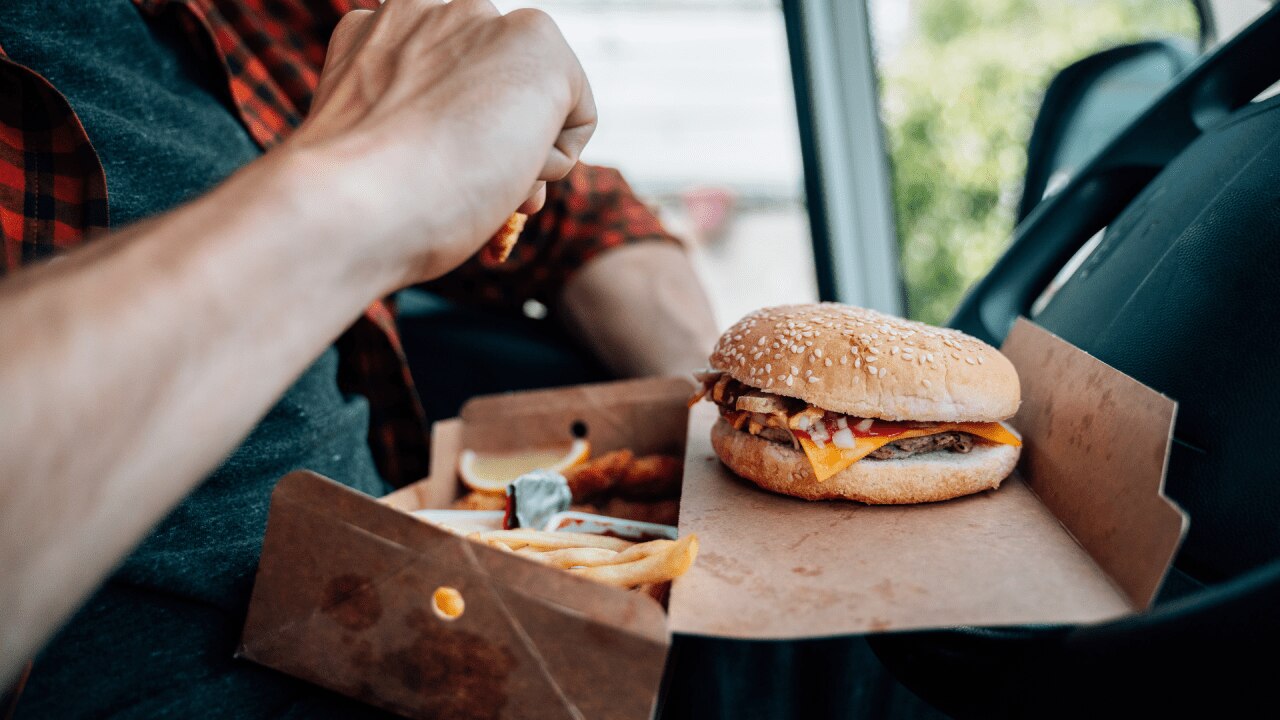Do you have a food addiction? Here’s how to tell
It's usually a sign of something deeper

Lifestyle
Don't miss out on the headlines from Lifestyle. Followed categories will be added to My News.
Beyond the odd blowout that sees you finish a packet of biscuits after a bad day, food addiction is a real and serious issue that affects thousands of Australians each year.
Most nights Casey* would wait for her husband to fall asleep before she would tip-toe into the kitchen. Deep within the pantry was her private trove. Chips, chocolates and lollies were packed away and concealed in old grocery bags. This covert indulgence offered a temporary respite from the unrelenting grip of food addiction - a silent struggle she was attempting to hide from everyone, including her husband.
Food addiction is often classed as disordered eating, which is the opposite of mindful eating, where people consume a variety of foods and can stop when full. Because disordered eating can be akin to an addiction, it is sometimes treated as such.
Disordered eating is a complex and challenging issue that impacts many people - it looks different to each person and no one pattern leads to disordered eating. It is often related to behaviours such as overeating, hiding, hoarding food and the inability to stop when full.
Like what you see? Sign up to our bodyandsoul.com.au newsletter for more stories like this.
It reveals itself as a compulsive, often distressing relationship with food, leading to both physical and emotional disruptions and imbalances. Those grappling with disordered eating often find themselves trapped in isolation, misunderstood by a society that too often trivialises their struggle. It is unlikely that there is one single factor that contributes to it. It is more likely that a combination of factors contribute to food addiction, including cultural influences, family culture around the food and childhood trauma or trauma.
Like other types of addiction, food addiction often has a connection to underlying trauma and to recover, the person must heal that first. While recovering from a substance addiction, a person needs to abstain from this particular substance. However, food is one of the basic needs required for one’s development and one can not abstain from eating. As a result, the recovery from food addiction is complex and a holistic approach is needed, including therapy and professional support such as navigation from a nutritionist.
What is food addiction?
At its core, food addiction mirrors the patterns and characteristics of substance addiction. It involves the consumption of specific foods or types of foods in excessive amounts, despite the knowledge of potential harm. Individuals with food addiction often experience a loss of control, using food to cope with stress, emotional distress, or boredom. This compulsive relationship with food can lead to overeating, obesity, and a host of associated health issues.
Food addiction is a silent struggle, in part due to society's sometimes insensitive attitude towards the issue. It's not unusual for those afflicted to be labelled as simply lacking willpower or discipline. However, the reality is far more complex.

Food addiction often involves underlying psychological and emotional factors, including trauma, which can make it a trauma response for some individuals. Whether it's the result of a single distressing event or a cumulative series of adversities, can be a significant driver of food addiction. Trauma can also create an emotional void that individuals try to fill with the comfort of food, leading to the vicious cycle of addiction.
It may be an attempt to self-soothe or an unconscious response to past experiences. Food, with its emotional and sensory qualities, can provide a temporary escape from emotional pain, creating a dependence on it as a coping mechanism.
For Casey*, her food addiction was directly linked to trauma that resulted from a violent past relationship. Her ex-partner controlled everything within their relationship - finances, holidays, her clothes and her friends. She felt powerless. Food was the only thing she could control for many years. Casey also felt a huge amount of guilt and shame and used food to relieve those emotions. Consuming large quantities of foods is often related to underlying feelings of guilt and shame that might have not been processed.
Supporting recovery
Recognising that it is not merely a matter of self-control but a complex interaction of psychological, emotional, and physiological factors is crucial. People struggling with food addiction require empathy, not judgment, to take the first step toward recovery. It is essential to create an environment where individuals can come forward, share their experiences, and seek support without fear of stigma.
Recovery from food addiction is possible, but it often requires a multi-faceted approach, including a team of counsellors, dietitians, therapy nurses, and often family therapy.

Acknowledgment and acceptance
The first step is acknowledging the issue and accepting that it is not a personal failure but a medical condition. It’s the result of something much deeper - usually underlying trauma. It is not about the food, it is about why one reaches out for the food. This can lead to further medical conditions, such as anxiety, and depression and can have an impact on physical health too. Self-compassion is vital.
Professional help
Seeking professional guidance from therapists, dietitians, nurses and doctors who specialise in addiction and trauma can provide the necessary tools for recovery.
Addressing underlying trauma
If trauma is a driving force behind food addiction, addressing the underlying trauma through therapy or support groups is essential. Group therapy can be very beneficial in reducing shame around food addiction.
Healthy coping strategies
Therapy will also be beneficial for developing healthier coping mechanisms to deal with emotional distress or trauma is crucial. This may include mindfulness, exercise, art therapy, or relaxation techniques.
Support systems
Building a support network of friends, family, or support groups can provide invaluable emotional support throughout the recovery process. Often people who struggle with food addictions find connection and recovery through 12-step programs.
By raising awareness and fostering a more compassionate environment, we can empower individuals battling food addiction to seek help and take the first steps toward recovery.
*Name has been changed
If you or someone you love is struggling with body image issues or eating disorders, contact the Butterfly National Helpline at 1800 33 4673 for free and confidential support, or email or chat with the team online here.
Silvia Roberts is a Primary Therapist at South Pacific Private, one of Australia’s leading trauma, addiction and mental health treatment centres.
More Coverage
Originally published as Do you have a food addiction? Here’s how to tell








